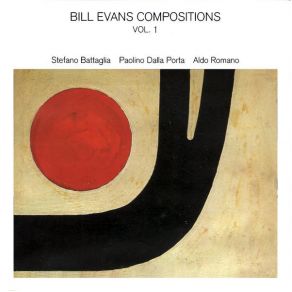Bill Evans Compositions, Vol. 1
Download links and information about Bill Evans Compositions, Vol. 1 by Stefano Battaglia. This album was released in 1992 and it belongs to Jazz genres. It contains 9 tracks with total duration of 01:04:16 minutes.

|
|
|---|---|
| Artist: | Stefano Battaglia |
| Release date: | 1992 |
| Genre: | Jazz |
| Tracks: | 9 |
| Duration: | 01:04:16 |
| Buy it NOW at: | |
| Buy on iTunes $9.99 | |
Tracks
[Edit]| No. | Title | Length |
|---|---|---|
| 1. | Interplay | 5:26 |
| 2. | Time Remembered | 6:55 |
| 3. | Orbit (Unless It's You) | 7:01 |
| 4. | Five | 5:12 |
| 5. | My Bells | 10:17 |
| 6. | Nardis | 9:16 |
| 7. | A Simple Matter of Convinction | 7:33 |
| 8. | Loose Bloose | 5:43 |
| 9. | Re: Person I Knew | 6:53 |
Details
[Edit]On the first volume of three projected sets of Bill Evans compositions, pianist Stefano Battaglia registers an album of his major influence's works with great savvy and unpredictability. Rather than moving into "Waltz for Debbie" territory right away, Battaglia and his rhythm section — prestigious as it is with Aldo Romano and Paolino Della Porta — commence with some of Evans' most compelling and difficult works. The set begins with "Interplay"; originally a date with Jim Hall and Freddie Hubbard, the tune is a study in counterpoint, not only against the other instruments, but in terms of pitting the two sides of the piano's register against the middle. Battaglia handles the arpeggios nicely in sharp staccato manner and shifts down into an introspective meditation on the complex three-part harmonic melody. On "My Bells," the large Evans harmonics are explored delicately and thoroughly with three major key figures wrapping around each other in a shimmering collection of eighth notes and glissandi; Romano dances around the languid chords with his brushes as Della Porta plays in hushed elegance to underscore the fragile beauty of the tune. Following this is the classic "Nardis," with Battaglia going inside the piano for food, bowing and scraping strings as Della Porta counters with subtle hammering on the lower register of the bass. It's a stunning, sympathetic reading that captures all of the isolation and darkness in the original, without giving up any of the melody to sentimentality. Battaglia's approach to Evans, despite his great affection for the man's work, is free of nostalgia. He has treated these compositions with the utmost sensitivity and respect by offering them as living compositions to be workshopped not as "classic" material, but as carrying within them the thread of the jazz life force itself. Amazing.